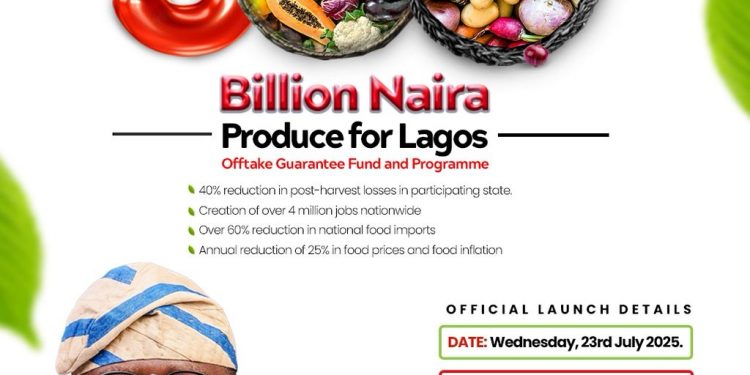Lagos State Governor Babajide Sanwo-Olu, alongside five other state governors, on Wednesday launched a ₦500 billion Produce-for-Lagos Off-taker Guarantee Fund. The initiative aims to catalyze food production, storage, logistics, and distribution across Nigeria, with Lagos as the major consumer hub.
The multi-billion-naira program was unveiled at Lagos House, Alausa, Ikeja, with Governors Dapo Abiodun (Ogun), Mohammed Bago (Niger), Ahmed Ododo (Kogi), Agbu Kefas (Taraba), and representatives from Ondo State joining the launch.
Also present were Deputy Governor of Lagos, Dr. Obafemi Hamzat; Ondo State Deputy Governor, Olajide Owolabi; Speaker of the Lagos State House of Assembly, Mudashiru Obasa; Minister for Digital Economy, Bosun Tijani; Minister of Finance, Wale Edun; Minister of State for Finance, Doris Annette; Lagos State Commissioner for Agriculture and Food Systems, Ms. Abisola Olusanya; and several traditional rulers, industry leaders, and members of the All Progressives Congress (APC), including businessman Tony Elumelu.
According to Commissioner Olusanya, the initiative is expected to:
- Reduce post-harvest losses in participating states by up to 40%
- Create over 4 million jobs nationwide
- Cut national food imports by more than 60%
- Lower food prices and inflation by at least 25% annually
“With the launch of the ₦500 billion Produce-for-Lagos Off-taker Guarantee Fund and program by Mr. Governor, I implore everyone to join us as we kickstart a bold vision to catalyze, empower, and scale food production, storage, logistics, marketing, and distribution across the nation,” said Olusanya.
She urged farmers, agribusinesses, and other value chain actors to come together to build a food sovereign system capable of feeding the nation’s growing population.
With a current population of over 25 million people, projected to hit 34 million by 2030, Lagos State is expected to require ₦7.96 trillion worth of food annually by the end of the decade. At current production levels, the state would have to import food valued at about ₦3.38 trillion each year to meet demand.
“To close this gap, Lagos must increase its local food production by at least 20% annually to reach 40% local production by 2030,” Olusanya stated, adding that partnerships and inter-state collaboration would be critical.
The Produce-for-Lagos initiative comes at a crucial time, as food inflation continues to affect millions of Nigerians. The program is expected to stimulate regional agricultural economies while positioning Lagos as the nucleus of a nationwide food supply chain.










